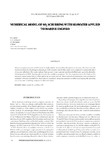Numerical Model of SO2 Scrubbing with Seawater Applied to Marine Engines

Ver/
Use este enlace para citar
http://hdl.handle.net/2183/34906
A non ser que se indique outra cousa, a licenza do ítem descríbese como Creative Commons Attribution-NonCommercial-NoDerivatives 3.0
Coleccións
- Investigación (EPEF) [592]
Metadatos
Mostrar o rexistro completo do ítemTítulo
Numerical Model of SO2 Scrubbing with Seawater Applied to Marine EnginesData
2016-06-30Cita bibliográfica
M.I. Lamas, C.G. Rodríguez, J.D. Rodríguez and J. Telmo, "Numerical Model of SO2 Scrubbing with Seawater Applied to Marine Engines," Polish Maritime Research, vol. 23, pp. 42, -04-01. 2016.
Resumo
[Abstract]: The present paper proposes a CFD model to study sulphur dioxide (SO2) absorption in seawater. The focus is on the treatment of marine diesel engine exhaust gas. Both seawater and distilled water were compared to analyze the effect of seawater alkalinity. The results indicate that seawater is more appropriate than distilled water due to its alkalinity, obtaining almost 100% cleaning efficiency for the conditions analyzed. This SO2 reduction meets the limits of SOx emission control areas (SECA) when operating on heavy fuel oil. These numerical simulations were satisfactory validated with experimental tests. Such data are essential in designing seawater scrubbers and judging the operating cost of seawater scrubbing compared to alternative fuels.
Palabras chave
Sulphur dioxide
Scrubbers
CFD
Scrubbers
CFD
Versión do editor
Dereitos
Creative Commons Attribution-NonCommercial-NoDerivatives 3.0
ISSN
2083-7429






